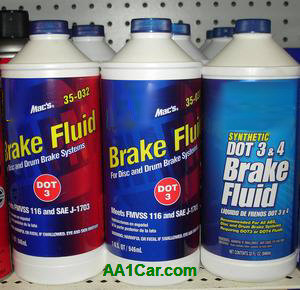
A great deal of heat is generated when braking, and some of this heat will transfer through brake components into the fluid. One of the most important qualities of brake fluid is its high boiling point, and its effective boiling point drops quickly as it absorbs moisture. This vent, along with the regular cycling of fluid levels, results in the air circulating within the master cylinder reservoir, where the brake fluid absorbs moisture from it. Master cylinder caps are generally vented, so this fluid displacement can’t result in a pressure or vacuum in the reservoir, which would incline the system to draw air in past the seals elsewhere. Also, each time the brakes are applied, the level of the fluid goes down a little, then back up when they are released. The level of brake fluid in the master cylinder reservoir steadily drops as brake pads wear and more fluid is taken up in the calipers. Because of the way that braking systems work, completely sealing the fluid away from the atmosphere isn’t practical. Both are polyglycol ether fluids, which are inherently hygroscopic, which is to say that they absorb moisture from the atmosphere. Why a Brake Fluid Flush is RecommendedĪlmost all automobiles use either DOT 3 or DOT 4 brake fluid in their braking systems. Prices are usually about the same for all the different ways of doing the job, although a shop on the higher end of the price scale is more likely to have fancier equipment that gets the job done faster. The result should be about the same in all cases. The general brake fluid flush cost range is from $80 to $150. In some cases, a vehicle with a large brake fluid reservoir, such as some ¾ ton trucks, costs a little more as it takes more fluid. Like all other fluids, it’s best to replace brake fluid before you notice any difference in your braking system.How much it costs to change brake fluid is pretty straightforward and usually a set price in most shops regardless of the vehicle. Unlike with other fluids, you may not be able to tell when your brake fluid has deteriorated simply by looking at it.


High, firm pedal if you’ve waited until it’s really bad and some components have rusted and don’t move.Spongy or dropping pedal, especially if you’re stepping on it several times as you drive down a hill.What would you notice if your brake fluid was dangerously low or contaminated with water? Why? Water in the brake fluid decreases its boiling point, allowing the fluid to boil and the brake pedal to fall to the floor. Unfortunately, even four or five drops of water are enough to be detrimental to your braking system and your safety. If the master cylinder reservoir is off, the fluid can pull water right out of the air. Because of its nature, brake fluid will pull water through hoses and rubber connections. Brake fluid is hydroscopic, meaning it absorbs moisture and expands. Brake fluid runs in a closed system, which is why it’s sometimes forgotten about and yet all the more important to keep fresh.Ģ. What happens when you forget about your brake fluid?ġ. When we are replacing a major component such as your brakes, it’s important to get all related components back to like-new vehicle performance. When your vehicle was new, all the brake components were new. We promote replacing brake fluid during a major brake replacement. We can perform free, no-obligation brake inspections to determine if your brake fluid can still withstand the heat generated in braking. Any time major brake replacement is being performed to ensure the new brake system works as designedĪs a preventative measure to help prevent brake failure, we recommend changing your brake fluid every 40,000 km or every two years.At a service interval of two years or 40,000 kilometres.Any time the tests show the fluid is a fail or near-fail.

However, since brake fluids share common properties, there are general standards across the automotive industry, including: While most vehicle fluids have clear rules about when they need to be checked, changed or flushed, brake fluid replacement standards vary among manufacturers. In short, without brake fluid, there is no braking. What does brake fluid do?īrake fluid transmits the pressure from your foot on the brake pedal to the master cylinder and on to the calipers that clamp the brake pads and stop your wheels (if you have disc brakes). Here are some guidelines and reasons for monitoring this all-important fluid. And yet for many drivers, even the ones who diligently check their engine oil, brake fluid is a forgotten fluid. Brake fluid is the lifeblood of your braking system, and it has one of the most important jobs of all.


 0 kommentar(er)
0 kommentar(er)
